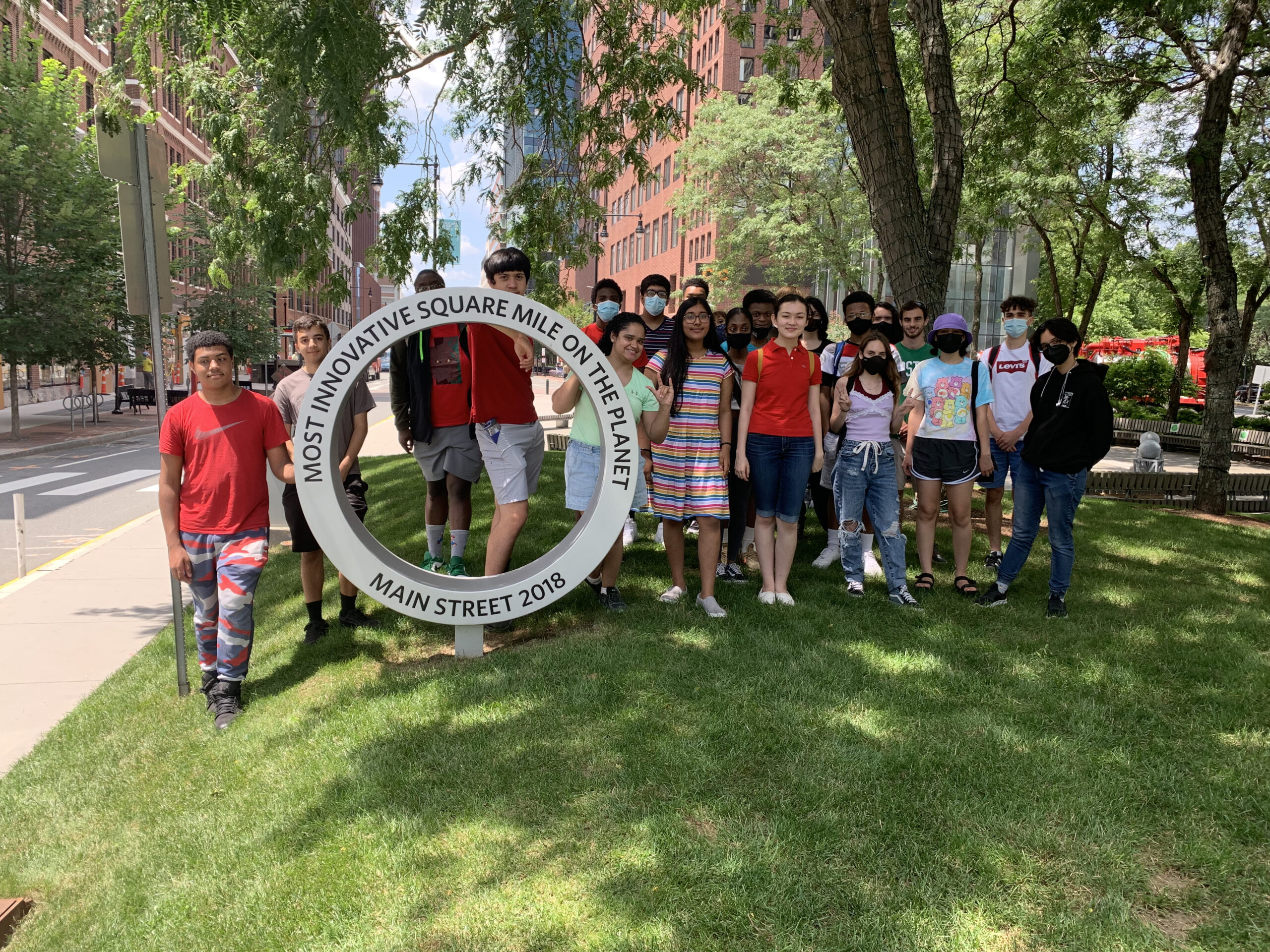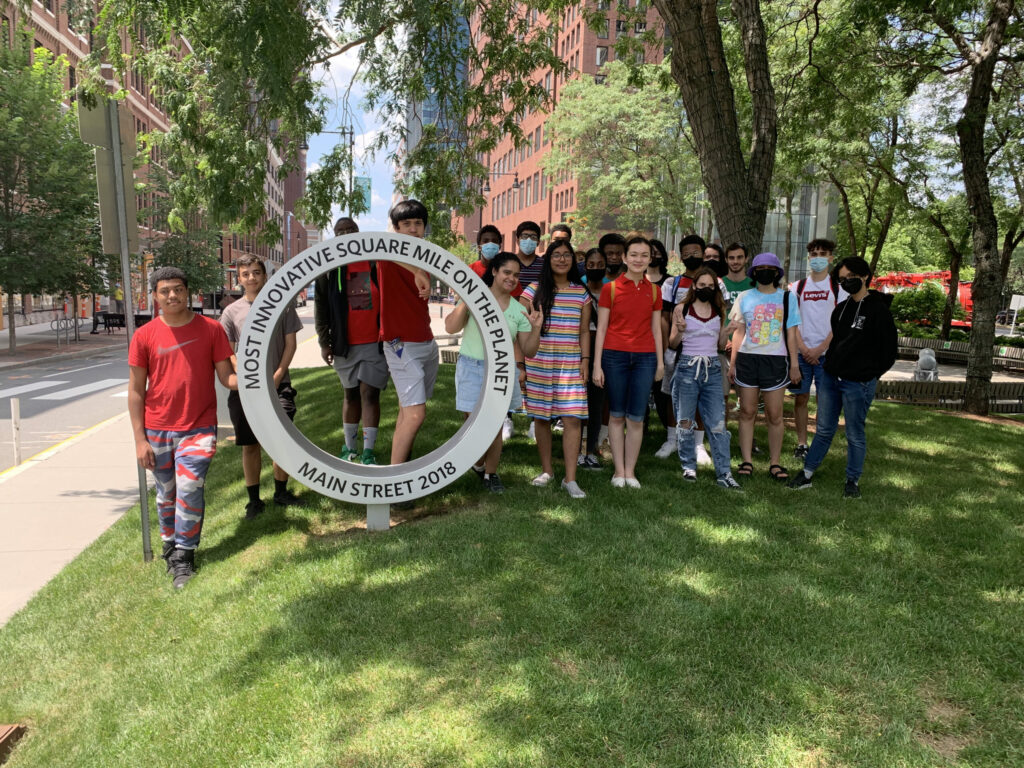
Michael Dawson’s career in STEM started with a tap on the shoulder.
Growing up in Florida, he remembers a guidance counselor at his high school pulled him aside and said she thought he’d be interested in an after-school engineering program. The experience in the program eventually led him to pursue a college degree and ultimately a career in engineering.
“If it wasn’t for that tap on my shoulder, my life wouldn’t be what it has become,” he says.
He felt a desire to give back to the community in the same way. Now living in the Greater Boston area, he and his wife, Donna—along with co-founders William Bagley, James Grigsby, Edward Johnson and Dana Thompson—founded Innovators for Purpose to do just that. The iFp co-founders chose Cambridge’s Fletcher Maynard Academy to launch the program in 2014. The under-resourced area of the city has seen little change despite the innovation boom taking place in the adjacent neighborhood. By combining his STEM background with her arts expertise, the Dawsons have worked to help young people discover their passions and cultivate critical skills.
“We wanted to introduce young people, especially those from under-represented groups, to opportunities that they walk by each and every day,” says Michael. “Their passions could be connected to some of the things that happen behind these doors but they’re just not aware of it. For the most part, their parents don’t work in Kendall Square. They have few role models or exposure to these types of opportunities, so it’s just a building with a name on it to them. So they don’t realize that there are life changing opportunities there if they really pursue it.”
In the years since 2014, Michael and Donna have engaged the youth community in Cambridge to pursue meaningful projects centered on topics like equity, racism, immigration and more. Their latest project, called Voices of 2 Blocks, was published in early January. It examines the disparity between Kendall Square, the most innovative square mile on the planet, and the neighborhoods surrounding it. The study aims to not only understand but also propose solutions to this systemic challenge, with a focus on education.
“These problems have been going on for decades and the more attention that we bring to it to help really start driving change, the better,” says Michael.
Student-Led Research and Change
When Donna and Michael first met with Fletcher Maynard Academy students in 2014, they were surprised by the students’ fervent desire to pursue the social justice issues taking place in their communities.
“We asked them, ‘What do you care about?’” says Donna, “We were thinking oh, maybe some environmental type issues. The response was mind-blowing: Gentrification. Racism. Immigration. This is real stuff going on in their lives.”
The Dawsons designed iFp to not only give students a platform to pursue these topics, but also help them actively develop skills that companies are looking for. Students in the program work on creative-problem-solving, communication, and aptitudes around all different types of technologies, from augmented reality to computer science.
“All of the skills that businesses claim are important and not being taught in school, we figured out how to help young people develop those skills and connect to problems that they are most concerned with,” Michael says.
Driving Social Justice in Cambridge
The summer of 2020 brought a new social justice challenge for iFp teens to reckon with: the murder of George Floyd, and the protests that followed.
“They were just blown away because they had not seen anything like this in their lifetime,” Donna recalls. “What do you do with all of that emotion?”
The Dawsons helped the students channel their thoughts, emotions and fears into an augmented reality installation called, “This Should Not Be.” Five augmented reality scenes spread across the Cambridge Public Library’s lawn walk viewers through the perspective of these students, beginning with the early hope for 2020, the arrival of COVID-19, the murder of George Floyd, culminating in a call to action for creating a New America. The project required the students to use not only augmented reality, but also technologies like sonification (making meaning of data with sound), data visualization, 3D animation, 2D graphics, and human-centered design.
But coming out of the project, the iFp teens felt their work wasn’t finished. Working with Michael and Donna, they identified a connection between education and the inequities they were seeing, and wanted to start a project on the subject. They dug into the research, from places like the Cambridge Community Foundation and others, to understand the challenges with education in their community today and begin to propose meaningful solutions. The publication of Voices of 2 Blocks is the latest example of their ongoing work to drive equity in the Cambridge community.
“There is lots of change going on in their neighborhoods, in Kendall Square, that ultimately they don’t feel connected to,” Donna says. “They see this growth happening here. And they’re saying. ‘This has taken away from my life because now we’re being displaced. So your growth is not so great for us.’ And so the question became, how might we become a part of this changing neighborhood? So we had to kind of reframe it because that’s what was missing, their voice.”
“They’re the ones who are being impacted the most,” Michael adds. “So now it’s time for their voices to be heard. Now’s the time for businesses to think about a shared future, that growth inclusive with community could be the key to unlocking our next innovations.. This report is the first part of that.” Download “Voices of 2 Blocks” to read the research, writing, and calls to action of Cambridge’s students.
